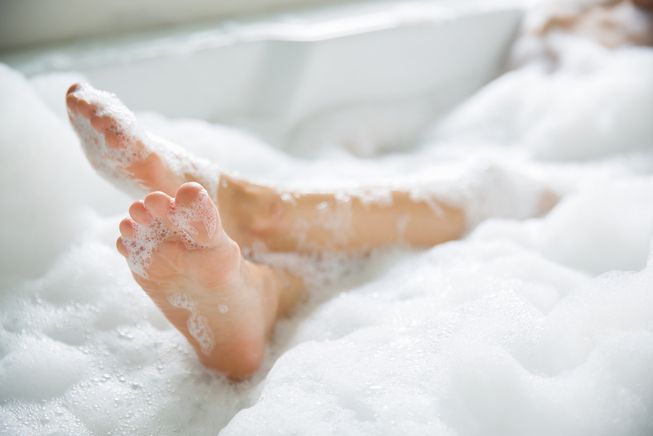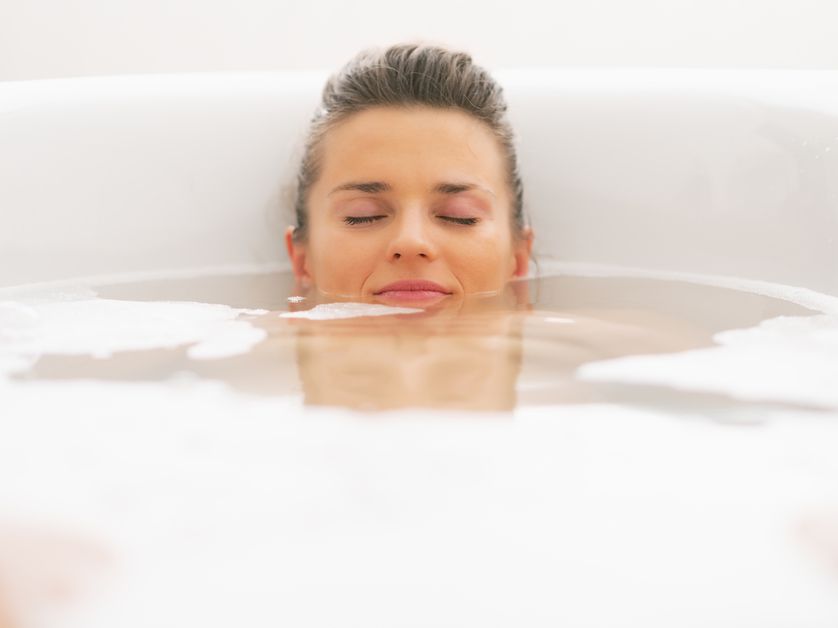定期洗澡如何帮助缓解抑郁
定期洗澡如何帮助缓解抑郁
Taking a bath can seem like a luxury, something you put off until you have a long weekend or a vacation. But if you have a decent tub, it doesn't have to be that way. In fact, it's one of the few low-cost ways of relaxing; a box of epsom salts and a bottle of lavender extract will set you back less than $15 and last for quite some time.
洗个澡似乎是件奢侈的事,你可以把它推迟到你有一个长周末或者假期的时候。但如果你有一个像样的浴缸,那就不需要这样了。事实上,这是少数几种低成本的放松方式之一;一盒泻盐和一瓶薰衣草提取物将花费你不到15美元,并能持续相当长一段时间。
If treating yourself to some low-cost stress-relief isn't enough to get you filling your tub, consider some intriguing research from Johannes Naumann at the University of Freiburg in Germany. Naumann found a small but significant amount of relief from depression symptoms in people who took afternoon baths versus people who exercised instead. The study appeared in BMC Complementary and Alternative Medicine.
如果泡澡这一低成本的减压措施还不足以让你放松自己,考虑一下德国弗莱堡大学约翰内斯·瑙曼的一些有趣研究。瑙曼发现,下午洗澡的人与进行锻炼的人相比,抑郁症状有少量但显著的缓解。这项研究发表在《BMC补充和替代医学》杂志上。

A bath can increase your core temperature, and that plays into your circadian rhythms. (Photo: TORWAISTUDIO/Shutterstock)
Traditionally, the rule has been that a hot bath can be stressful on the heart, so those with pulmonary issues should check with a doctor about a smart bathing routine. But new research shows it might be worth investigating.
传统上的规则是,洗热水澡会给心脏带来压力,所以那些有肺部问题的人应该向医生咨询一下如何正确地洗澡。但新的研究表明,这可能很值得研究。
Researchers in Japan followed the bathing habits of 30,076 men and women from 1990 through 2009. They were divided into three groups: people who took two or fewer baths a week, three to four baths a week, or daily baths. They found that more frequent bathers and lower incidence of coronary heart disease, and the temperature of the water didn't make a difference.
从1990年到2009年,日本研究人员对30,076名男性和女性的洗澡习惯进行了跟踪调查。他们被分为三组:每周洗澡两次或更少的人,每周洗澡三到四次的人,或每天洗澡的人。他们发现,更频繁地泡澡和更低的冠心病发病率以及水温并没有什么区别。
More specifically, they found that those who took baths three to four times had a 25 percent lower risk of coronary heart disease and a 13 percent lower risk of stroke. Daily bathers had a 35 percent lower risk of coronary heart disease and a 23 percent lower risk of stroke, according to The New York Times.
更具体地说,他们发现洗澡三到四次的人患冠心病的风险降低了25%,患中风的风险降低了13%。据《纽约时报》报道,每天洗澡的人患冠心病的风险降低了35%,患中风的风险降低了23%。
The study, published in the journal Heart, didn't answer why the benefits were so notable, but the researchers suggest that warm baths lower blood pressure and improve blood vessel function.
这项发表在《心脏》杂志上的研究没有解释为什么这种益处如此显著,但研究人员认为,洗热水澡可以降低血压,改善血管功能。

Regular baths may have a preventive effect against cardiovascular disease. (Photo: Alliance/Shutterstock)
It seems a hot bath definitely can't hurt, and is likely to have numerous benefits, from plain-old relaxation of tense muscles to a mental mini-getaway from whatever else is going on in life. Other experiments have shown that before-bed baths can help you sleep by opening up your capillaries and allowing the body to quickly get rid of excess heat quickly. (These results depend on the person sleeping in a cool room.)
洗个热水澡似乎绝对没有坏处,而且可能有很多好处,从放松紧张的肌肉到在精神上暂时逃离生活中发生的一切。其他实验表明,睡前洗澡可以打开你的毛细血管,让身体快速排出多余的热量,从而帮助你入睡。(这些结果取决于睡在凉爽房间里的人。)
If you want to try this at home, keep screens out of the tub — both to reduce stress levels and to keep expensive electronics away from water — and pick up a paperback book. (And if it gets wet, no worries, just leave it out to dry.) No need for fancy bath additions; try epsom salts, essential oils, which are now available even in local pharmacies, olive oil, or just run some shower gel under the bath faucet — it will foam up with bubbles.
如果你想在家里尝试这个,把屏幕放在浴缸外面——既可以减轻压力,也可以让昂贵的电子产品远离水——然后拿起一本平装书。(如果它变湿了,不用担心,让它晾干就行了。)不需要花哨的浴室添加;试试泻盐,精油,现在甚至在当地的药店都可以买到,橄榄油,或者在浴缸的水龙头下放一些沐浴露——它会产生泡沫。


















